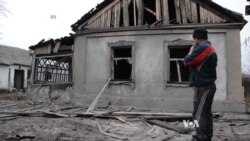With world leaders gathering in Australia for a meeting of the Group of 20 economic powers, Russian President Vladimir Putin accused the United States of "crudely violating" the spirit of international cooperation that should drive groups such as the G20.
In an interview published Friday, the Kremlin leader said that during the two-day summit he would not bring up the issue of sanctions, imposed by the United States and the European Union, for Russia's military activity in Ukraine. But he said he would respond if other national leaders broached the topic.
"Of course, it is harming us to some extent, but it is harmful for them as well,” he was quoted by the Russian news agency Tass as saying. “It undermines the whole system of international economic relations.”
EU President Herman von Rompuy said European foreign ministers would meet Monday after the summit to assess the situation in Ukraine and talk about "possible further steps," which could mean more sanctions.
EU leaders also plan to discuss Ukraine with President Barack Obama on the sidelines of the summit.
The comments came as the September cease-fire in eastern Ukraine has rapidly fallen apart. Shells fell Thursday on the Donetsk suburb of Petrovskiy, damaging homes and injuring at least one person.
Ukraine, NATO and others criticized Russia this week for sending troops and heavy weapons into the eastern region, home to many who oppose the Kyiv government. Moscow has denied the accusations.
Nick Redman of the International Institute for Strategic Studies said Russia may be worried about keeping the annexed peninsula of Crimea supplied through the winter. Ukraine has cut the Black Sea region off from the mainland; the only overland supply line with Russia is across the Kerch Straits.
“With the onset of winter, it will be difficult for Russia to supply Crimea; it might be more useful to have some sort of land corridor," he said. "Within this there is a broader political dynamic, of course. It suits the Russian leadership quite well to keep the Ukrainians off balance.”
Show of strength
The show of force in Ukraine comes amid other belligerent moves by the Russian military. Russia sent warships to international waters off Australia ahead of the G20 meeting — a clear message, said Andrew Foxall of the Henry Jackson Society, a policy group.
Since the G20 is primarily an economic forum, Russia is using the summit to bolster its ailing global standing, he said.
“To assure investors that Russia is a sound place to invest," he said. "That its economy, despite what is happening, is sustainable.”
Australia has sent its fleet into international waters to monitor the activity of the four Russian warships when they arrived off the country's northeast coast.
Russia's Defense Ministry said this week that long-range warplanes would be conducting flights into the Gulf of Mexico and Caribbean Sea, an area that has not seen Russian bombers for many years.
Russian authorities said naval and air force activities are merely routine training missions, testing equipment range. Australian Prime Minister Tony Abbott accused Putin of trying to "revive the lost glories of czarism" for his country.
“[Putin] will be looking to demonstrate that Russia, despite what the West says, is a great power," Foxall said. "And Russia’s sending of its warships to Australia, I think, seeks to do that. Secondly, of course, he will be trying to demonstrate that despite what the West says, Russia is not isolated internationally.”
Putin’s strategy to counter that isolation involves courting Asian states. The Kremlin recently sealed a $400 billion gas deal with China and sees a pivot to the East as a vital part of future diplomacy, Redman said.
“Western states now, particularly the United States, are regarded as an enemy and a competitor," Redman said. "Obviously it makes sense for Russia to pivot to the emerging world.”
Abbott said the G20 members should focus on economic issues during their upcoming meetings, despite the security situation in Ukraine and continuing debate over climate change issues.
Obama was traveling to Australia from Myanmar, where he met with national leaders and called for continuing efforts toward democratic dialogue following decades of military rule.





